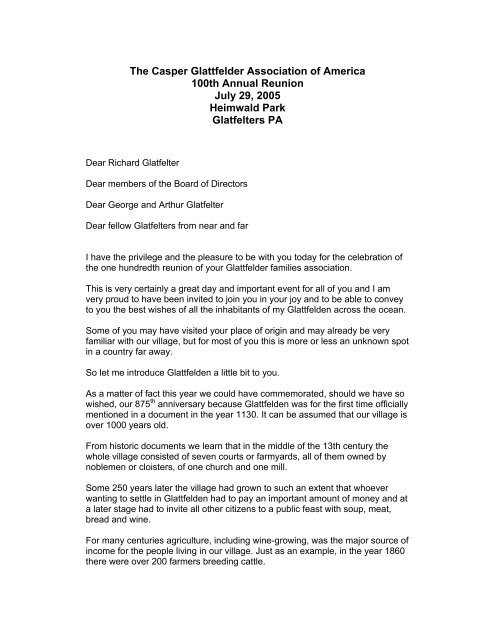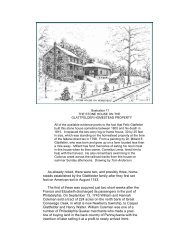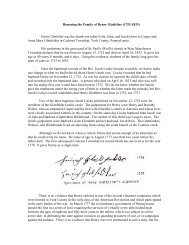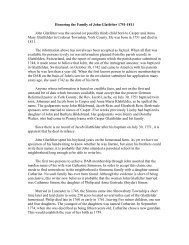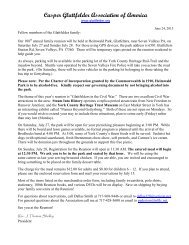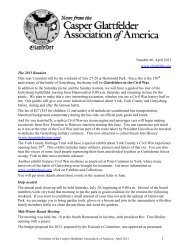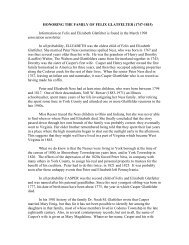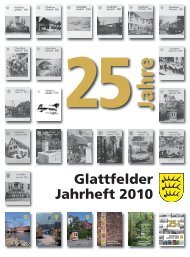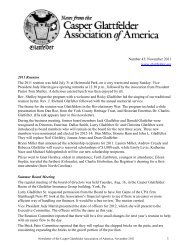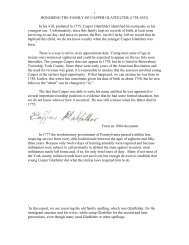here - Casper Glattfelder Association Of America's
here - Casper Glattfelder Association Of America's
here - Casper Glattfelder Association Of America's
You also want an ePaper? Increase the reach of your titles
YUMPU automatically turns print PDFs into web optimized ePapers that Google loves.
The <strong>Casper</strong> <strong>Glattfelder</strong> <strong>Association</strong> of America<br />
100th Annual Reunion<br />
July 29, 2005<br />
Heimwald Park<br />
Glatfelters PA<br />
Dear Richard Glatfelter<br />
Dear members of the Board of Directors<br />
Dear George and Arthur Glatfelter<br />
Dear fellow Glatfelters from near and far<br />
I have the privilege and the pleasure to be with you today for the celebration of<br />
the one hundredth reunion of your <strong>Glattfelder</strong> families association.<br />
This is very certainly a great day and important event for all of you and I am<br />
very proud to have been invited to join you in your joy and to be able to convey<br />
to you the best wishes of all the inhabitants of my Glattfelden across the ocean.<br />
Some of you may have visited your place of origin and may already be very<br />
familiar with our village, but for most of you this is more or less an unknown spot<br />
in a country far away.<br />
So let me introduce Glattfelden a little bit to you.<br />
As a matter of fact this year we could have commemorated, should we have so<br />
wished, our 875 th anniversary because Glattfelden was for the first time officially<br />
mentioned in a document in the year 1130. It can be assumed that our village is<br />
over 1000 years old.<br />
From historic documents we learn that in the middle of the 13th century the<br />
whole village consisted of seven courts or farmyards, all of them owned by<br />
noblemen or cloisters, of one church and one mill.<br />
Some 250 years later the village had grown to such an extent that whoever<br />
wanting to settle in Glattfelden had to pay an important amount of money and at<br />
a later stage had to invite all other citizens to a public feast with soup, meat,<br />
bread and wine.<br />
For many centuries agriculture, including wine-growing, was the major source of<br />
income for the people living in our village. Just as an example, in the year 1860<br />
t<strong>here</strong> were over 200 farmers breeding cattle.
Emigration from Glattfelden to America took place twice, in the years between<br />
1738 and 1743, when a total of 53 persons looked for a new home place in the<br />
colonies of North America, and around 1850, when some 100 persons<br />
immigrated to your place of living.<br />
Your ancestors, as you know better than I, were among the first group that left<br />
Glattfelden. In the chronicle of our village it is written that because of the work of<br />
Dr. Charles Glatfelter it is known that a group of eleven people travelled to<br />
Rotterdam on the river Rhine and boarded the ship “Francis and Elizabeth”,<br />
bringing them to Philadelphia in Pennsylvania on a seven to 12 weeks boat trip.<br />
From the records it would appear that the journey was rather dangerous,<br />
because only eight people out of eleven seemingly arrived safely in<br />
Philadelphia.<br />
The industrialization in our village started some fifty years after the departure of<br />
your ancestors to America. In the year 1783 a silk mill was put into operation,<br />
but already in 1795 production was stopped. Sixty years later a cotton spinning<br />
mill was opened, followed by a second one in 1806. One year later also a<br />
weaving mill commenced production.<br />
Because of the growing international competition and eroding margins most of<br />
these mills had to be closed at the end of the 1970ies.<br />
At this point in time one cotton spinning mill is still in use and an other mill<br />
situated at the outskirts of our village has been classified as a historical<br />
monument.<br />
Our region has one major resource, gravel. Due to this fact in the late 1920ies<br />
the first gravel pit was taken in use. The quarrying of gravel including the<br />
production of concrete as well as the recycling of building material continues<br />
and will certainly continue for many more decades.<br />
After this very short look back, let me describe you our village as it is today.<br />
The municipality of Glattfelden covers about 3'051 acres of land.<br />
The population amounts to almost 4000 persons in over 1700 households.<br />
Some 20 per cent are of foreign origin.<br />
As a comparison, in the year 1729 Glattfelden counted 750 inhabitants in 166<br />
households.<br />
During the last 30 years the population has grown by about almost 15 per cent.<br />
The place of work of the majority of the gainfully employed is away from<br />
Glattfelden, be it in the nearby cities of Zurich and Winterthur or at the Zurich<br />
airport. However, we still have a good number of small commercial enterprises<br />
and workmen in our village.<br />
2
Agriculture continues to play a certain, but clearly very minor role. T<strong>here</strong> are<br />
almost two dozens of farms left, out of which about half of them make their<br />
living only from farming. The growing of wine is also cultivated again and one<br />
very initiative farmer produces a white Riesling wine and two red wines.<br />
During the last few years Glattfelden has become a mini-Hollywood, or<br />
Glattwood. In a part of the former cotton spinning mill the production of<br />
television programmes was started.<br />
Ladies and Gentlemen, I am proud to be able to say that we have a very<br />
attractive village.<br />
We are situated in the midst of a charming and peaceful landscape, surrounded<br />
by small hills with a lot of forests. The river Glatt flows along one side of the<br />
valley, in which our village is embedded, to then joint the waters of father Rhine.<br />
This landscape with many different paths, tracks and trails, away from all traffic,<br />
invites for walking, jogging and biking.<br />
The middle of the village is formed by many ancient, well maintained houses, an<br />
idyllic place to stroll around.<br />
We have a number of attractive sights to be visited. Two of them relate to<br />
electricity. T<strong>here</strong> is a small power station which was built on the river Glatt,<br />
before it hat do be corrected in order to avoid further flooding. It is today a very<br />
interesting museum around and about electricity.<br />
We have the great brother, a still productive power station in the river Rhine,<br />
which is listed in the national inventory of culturally historical constructions.<br />
Our biggest pride is our place of cultural interest built in memoriam of Gottfried<br />
Keller, one of the most important writers and poems in the German language of<br />
his time. Having spent many years of his life in Glattfelden, this place was built<br />
to always remember his works and to host a permanent exhibition on Gottfried<br />
Keller.<br />
I invite all of you that have not yet found the way to their place of origin to visit<br />
us rather sooner than later.<br />
Now back to this day and this event.<br />
It has always been and is still always said, that Switzerland tries to keep<br />
tradition high.<br />
But I have to say that we can learn from you. Your reunion today and during the<br />
next two days is the best proof of what family ties can do, of what tradition is.<br />
You have kept to it also through rough seas and you can now proudly meet for<br />
the one hundredth time.<br />
3
All I can do is to just express to you my admiration for having been doing so and<br />
to express my wish that this may continue well over the next one hundred<br />
years.<br />
I have not come <strong>here</strong> completely empty handed and in order to prove my words<br />
about the attraction of our village I have brought with me six plates, each of<br />
them showing a picture from our village.<br />
I hope you will find a suitable place in your pavilion so that you and your<br />
descendants will always be reminded about w<strong>here</strong> the roots of their families can<br />
be found.<br />
Let me thank you for having been listening to me and let me close my address<br />
in a somewhat unusual way.<br />
Kamerade wämmer sii, immer zäme hebe.<br />
Nid nu bime Glesli Wii, nei au suscht im Läbe.<br />
Wänns Der einisch nid rächt gaht, bruchsch en Fründ wo zue Der staht.<br />
Wänns Der einisch nid rächt gaht, bruchsch en Fründ wo würkli zue Der staht.<br />
Comrades we all want to be, always hold together.<br />
Not only with a glass of wine, no also during daily life.<br />
If at one time sad are you, you need a friend who cares for you.<br />
If at one time sad are you, you need a friend who really cares for you.<br />
24. Juli 2005<br />
4


